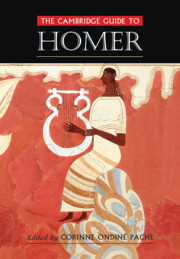Book contents
- The Cambridge Guide to Homer
- The Cambridge Guide to Homer
- Copyright page
- Contents
- Figures
- Notes on the Contributors
- General Introduction
- Part I Homeric Song and Text
- Part II Homeric World
- Introduction
- Homeric Communities
- Homeric Religion
- Homer and History
- Homeric Geography
- Homeric Materiality
- Key Topics
- Afterlife in Homer
- Assemblies and Councils
- Athletic Competition
- Basileus and Anax in Homer and Mycenaean Greek Texts
- Blegen, Carl
- Boars’ Tusk Helmets
- Burial Practices
- Catalogue of Ships: Archaeology
- Catalogue of Ships: Literary Aspects
- Class Relations
- The Literary Tradition of Destruction of Cities
- Divine Epiphany in Homer
- Family and Marriage in Homer
- Feasting and Drinking in Homer
- Archaeology of Hero Cults
- Hittite Literary Evidence
- Homeric Archaeology
- Homeric Economy
- Household Organization
- Lefkandi
- Mycenae
- Nestor’s Cup
- Nostoi
- Offerings in Homer
- Personification in Homer
- Prayers and Vows
- Pylos
- Religious Festivals in Homer
- Schliemann, Heinrich
- Shield of Achilles
- Slavery in Homer and Hesiod
- Supplication in Homer
- Troy and Its Treasures
- Warfare in Homer
- Warrior Graves
- Weapons and Armor
- Women in Homer
- Part III Homer in the World
- Bibliography
- Index
Warfare in Homer
from Key Topics
Published online by Cambridge University Press: 22 February 2020
- The Cambridge Guide to Homer
- The Cambridge Guide to Homer
- Copyright page
- Contents
- Figures
- Notes on the Contributors
- General Introduction
- Part I Homeric Song and Text
- Part II Homeric World
- Introduction
- Homeric Communities
- Homeric Religion
- Homer and History
- Homeric Geography
- Homeric Materiality
- Key Topics
- Afterlife in Homer
- Assemblies and Councils
- Athletic Competition
- Basileus and Anax in Homer and Mycenaean Greek Texts
- Blegen, Carl
- Boars’ Tusk Helmets
- Burial Practices
- Catalogue of Ships: Archaeology
- Catalogue of Ships: Literary Aspects
- Class Relations
- The Literary Tradition of Destruction of Cities
- Divine Epiphany in Homer
- Family and Marriage in Homer
- Feasting and Drinking in Homer
- Archaeology of Hero Cults
- Hittite Literary Evidence
- Homeric Archaeology
- Homeric Economy
- Household Organization
- Lefkandi
- Mycenae
- Nestor’s Cup
- Nostoi
- Offerings in Homer
- Personification in Homer
- Prayers and Vows
- Pylos
- Religious Festivals in Homer
- Schliemann, Heinrich
- Shield of Achilles
- Slavery in Homer and Hesiod
- Supplication in Homer
- Troy and Its Treasures
- Warfare in Homer
- Warrior Graves
- Weapons and Armor
- Women in Homer
- Part III Homer in the World
- Bibliography
- Index
Summary
The Homeric epics are the Ur-texts in Western culture that encapsulate and convey what happens to human beings (soldiers and civilians) and human societies (Greek and Anatolian) when they are at war. Here we discuss how the Homeric poems function as central enculturating stories about war from their formative period as diverse oral songs in the late Greek Bronze Age (1500‒1200 b.c.e.) through their coalescence eventually as canonical texts in the Greek historical period (800‒500 b.c.e.) and the qualities in the Iliad and Odyssey that have given rise in modern times (1870 to the present) to wonder, horror, admiration, bewilderment, cynicism, and idealism in war veterans, war poets, storytellers, and prominent thinkers from Friedrich Nietzsche and Simone Weil to Wilfred Owen, Yusef Komunyakaa, Allen Ginsburg, Tim O’Brien, and Alice Oswald.
Keywords
- Type
- Chapter
- Information
- The Cambridge Guide to Homer , pp. 395 - 398Publisher: Cambridge University PressPrint publication year: 2020

